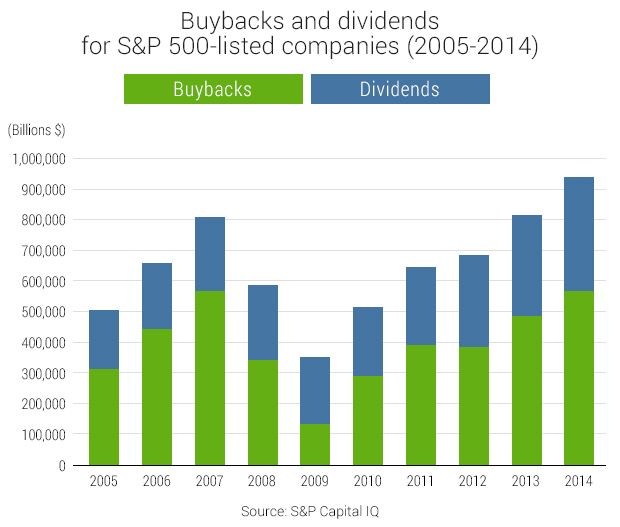How record stock buybacks inflate the markets
A company's rising stock price signals its strong financial performance, visionary leadership, skilled workforce, and trailblazing research and development. Or maybe the company is just buying a boatload of its own shares.
For some investors, stock buybacks have always had the whiff of financial legerdemain, juicing short-term growth with cash better used on products, R&D and other engines of long-term growth. Critics say these buybacks take a cumulative toll on the U.S. economy. Bank of America Merrill Lynch analysts estimate that for every job created in the U.S. this decade, American corporations have spent $296,000 purchasing their shares.
Others, including many top CEOs, see the practice as a legitimate way to reward shareholders. Either way, buybacks are going through the roof. Along with levitating company stocks, that's helping prop up financial markets that have recently proved vulnerable to concerns about slowing global growth and the prospects of rising U.S. interest rates.
For the 12-month period ending in June, a raft of corporate giants has spent more than $553 billion to repurchase their stock, up nearly 4 percent from a year ago, according to S&P Dow Jones Indices. The number of buyback announcements in 2015 has jumped 50 percent over last year.
"Buybacks are a major component of the support and upward push within markets, and a lot of that has been fueled by the ability to get cheap financing," said Howard Silverblatt, senior index analyst with S&P Dow Jones Indices. "For the sixth quarter in a row, companies are buying their (earnings per share) growth via buybacks."
Leading the charge are bellwethers including Apple (AAPL), Boeing (BA), General Motors (GM), Home Depot (HD) JPMorgan Chase (JPM) and McDonald's (MCD), although a large swath of publicly held companies have bought back shares this year.
All told, more than 20 percent of S&P 500-listed companies have increased the number of shares they hold in 2015, adding at least 4 percent to their EPS. Since 2009, when the recession ended, buybacks have accounted for 21 percent of the buildup in market capitalization for the S&P 500.
And in the short term, at least, buybacks can work wonders to jump-start a company's stock price, or contain the damage when growth slows. To cite one recent example of the power of buybacks, United Technologies (UTX) shares rose last month even after its revenue and earnings per share fell. The key? The conglomerate said it would expand its stock buyback plan by $12 billion.
Several factors are driving the surge in buybacks. First, with interest rates still near zero, it's cheap for companies to borrow money they can use to buy shares. "The old addiction was low rates, and the new addiction is buybacks," Silverblatt said.
Of course, nothing is stopping companies from sinking that cheap money into R&D or other areas aimed at spurring longer-term growth. For the most part, however, it's going to fund buybacks, mergers and acquisitions, and other ways to quickly energize stock prices. "It's very expensive," said Silverblatt.
Second, companies are sitting on mountains of cash. As of June, S&P 500 companies had a combined $1.3 trillion in cash and equivalents, a sum S&P Capital IQ says is increasingly being used for buybacks and dividend payments, the other principal way businesses return value to shareholders. (Companies returned a record $923 billion in dividends and buybacks in the one-year period ending in June, according to S&P Capital IQ.)
Raising the pressure on companies to spread the wealth are so-called activist investors, who look to boost a company's value -- and the value of their stake -- by pushing management to buy back stock. Earlier this year, for example, Apple upped its share repurchase authorization by $50 billion after billionaire investor Carl Icahn leaned on CEO Tim Cook.
Third, and perhaps the main reason buybacks are so popular these days: Many companies are finding it tough to increase sales and revenue organically at a time the U.S. economy is growing only about 2 percent a year and conditions overseas are turbulent.
Forecasters expect the trend to continue. Ed Yardeni, president and chief investment strategist for institutional investor advisory Yardeni Research, predicted in a recent note that companies will have to engage in "lots of financial engineering" to drive revenue gains in the year to come as global growth ticks down.
